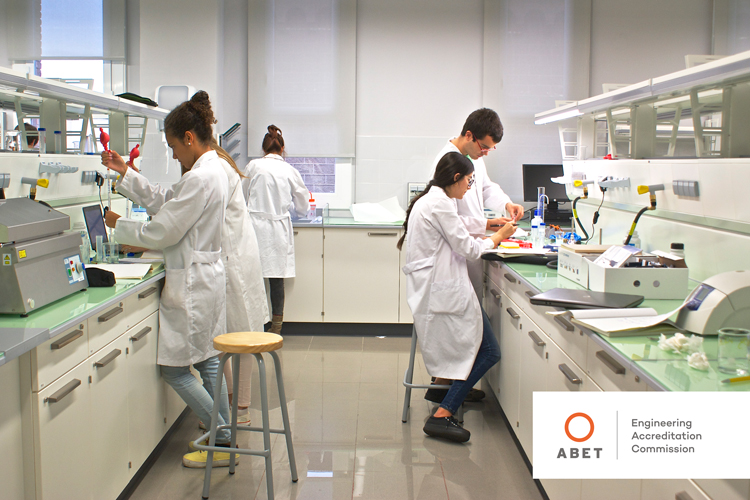In August, the Accreditation Board for Engineering and Technology (ABET) gave formal notice that four programmes from the IQS School of Engineering received a positive resolution with no recommendations or remarks: the Undergraduate Programme in Chemical Engineering, the Undergraduate Programme in Industrial Engineering, the Master’s Degree in Chemical Engineering, and the Master’s Degree in Industrial Engineering. IQS is the only institution in Spain with both Chemical Engineering and Industrial Engineering accredited within the same university.
In August, the Accreditation Board for Engineering and Technology (ABET) gave formal notice that four programmes from the IQS School of Engineering received a positive resolution with no recommendations or remarks: the Undergraduate Programme in Chemical Engineering, the Undergraduate Programme in Industrial Engineering, the Master's Degree in Chemical Engineering, and the Master's Degree in Industrial Engineering. IQS is the only institution in Spain with both Chemical Engineering and Industrial Engineering accredited within the same university.
Notably, IQS's five-year Chemical Engineering programme was the first degree in Spain to obtain ABET accreditation in 2004, and has always continued to receive accreditation since then.
Last December, the ABET Engineering Accreditation Commission (EAC) visited IQS to evaluate the official degree programmes offered by the IQS School of Engineering and to expand the scope of the accreditation for the Undergraduate Programme in Chemical Engineering and the Master's Degree in Industrial Engineering, which had already received accreditation, to the Undergraduate Programme in Industrial Engineering and the Master's Degree in Chemical Engineering.
The Final Statement issued by the EAC highlighted the following strengths of the two programmes that were seeking accreditation: for the Undergraduate Programme in Industrial Engineering, the student-first approach by professors and the high level of student involvement in how the degree is coordinated, reinforcing students’ potential and ensuring that they are optimally prepared. Regarding the Master's Degree in Chemical Engineering, the EAC highlighted the introduction of business management, innovation, and entrepreneurship components that enable students to discover how the principles of chemistry and engineering can be applied to the development of new ideas, processes, and products that meet the highest levels of quality, safety, and environmental care.
As to the programmes that were already accredited, the EAC report highlighted the strengths of the practical orientation of the Undergraduate Programme in Chemical Engineering, solidified through the great emphasis placed on experimental activities in the laboratory and pilot plant as well as in the required in-company internships that prepare students for both immediate employment after graduation and a professional career in the fields of industry or research. The EAC also highlighted the curriculum of the Master's Degree in Industrial Engineering, which offers an optimal combination of theory and advanced laboratory work in various areas of knowledge that are highly-valued by employers. The programme produces graduates with highly-qualified professional profiles and an exemplary capacity to quickly adapt to industrial settings and to participate in a vast array of projects and work areas thanks to the knowledge students gain during their studies in the master's degree.
Obtaining these accreditations is a testament to the hard, yet greatly-satisfying work IQS has done in recent years. IQS is also proud to have received accreditation from AQU Catalonia during this academic year, and all undergraduate and master's degree programmes are accredited with various mentions of excellence – one of the first universities in Spain to achieve this honour.
Originally founded in 1932 as the “Engineers' Council for Professional Development (ECPD)” then evolving into the “Accreditation Board for Engineering and Technology,” ABET is a non-profit organization that accredits university programmes in the fields of applied and natural science, computing, engineering, and engineering technology. To date, 812 colleges and universities in 32 countries have received ABET accreditation.
ABET accreditation ensures that students, entrepreneurs, and society in general can be certain that the accredited programmes meet strict quality standards that produce well-trained graduates who are ready to join the workforce in STEM fields at any sort of institution, both locally and globally.











